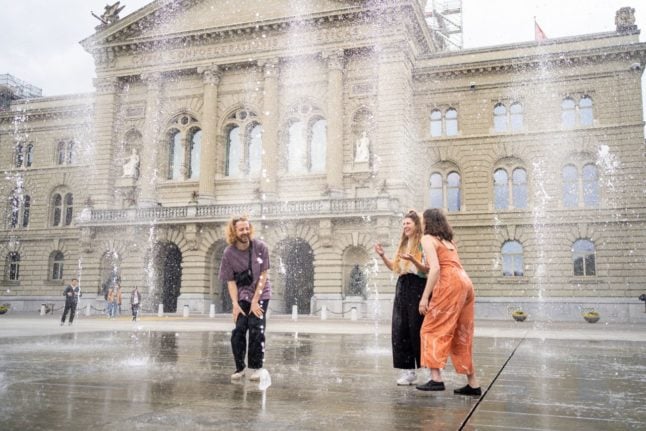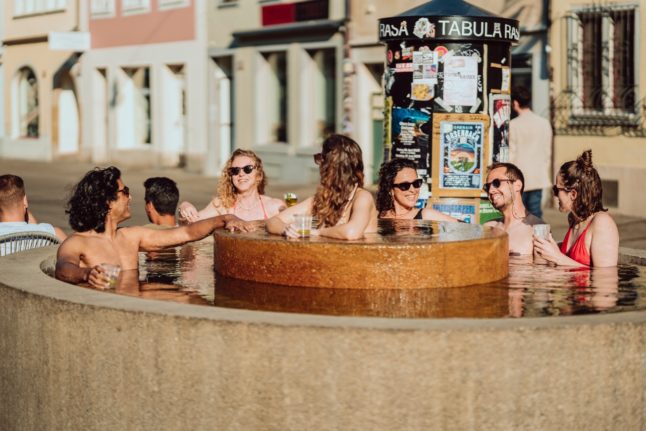In the Swiss city of Winterthur, north east of Zurich, fountain bathing is a long-standing tradition. On hot days, head down to the Steinberggasse and you’ll find residents stripping off and getting into the water.
“Because the city of Winterthur doesn’t have a lake or a major river, some people like to bathe in the fountains in the middle of town,” says Switzerland Tourism.
And tourism bosses have embraced this ritual as part of their 2023 summer campaign.
In a promo video montage, ski star and influencer Andri Ragettli stands on a mountain before jumping into Lake Zurich and seconds later he emerges from the Judd Fountain in Winterthur.
The tourism agency wants to “bring a summer feeling to Swiss cities” with their campaign highlighting fountain bathing. And it is certainly a good way to cool down on extremely hot days.
But is it allowed everywhere?
Switzerland’s Blick checked out a handful of Swiss cities to find out their stance on fountain bathing. Here are the rules at a glance.
Aarau
The town of Aarau has around 80 fountains – and bathing in them is allowed. However, since the fountains are not that big, it is not really possible to get inside them fully. Jens Hübner, head of Aarau’s civil engineering office, recommends the water features in Rathausgasse and Metzgergasse in the old town.
“Anyone who is out and about in the old town and longs for a quick cool-down on the way can put their feet in the city stream,” says Hübner.
Bern
If you’re looking to cool down in the Swiss capital head to Bundesplatz in front of the Bundeshaus where the water fountains provide a shower. Like a lawn sprinkler, you can run or hop through the fountains to escape the heat. This is one that children love especially.
READ ALSO: Are Swiss lakes and rivers clean enough to swim in?
Basel
Fountain bathing is allowed in the city on the Rhine, but it is not actively encouraged (at least at the moment).
Alex Dänzer, head of operations and maintenance of the public fountains in Basel, said: “We’ve had repeated noise complaints in recent years because fountain bathers didn’t keep quiet at night.”
One thing to note is that dogs are not allowed in any fountains because their fur can clog the filters and drains.
Bathing isn’t permitted for anyone in some fountains such as the Fasnacht fountain, as there are moving parts in the basin that can injure or be damaged themselves. The Zschokke Fountain near the Wettstein Bridge is a good choice to check out if you do want to dip in the water (but don’t do it late at night!).
Lucerne
Dipping into the fountains is not allowed in Lucerne. The Road Inspectorate writes: “The fountains in the city of Lucerne are protected as historical cultural assets and the ornamental fountain poles with the figures could be damaged if climbed on.”
The office points out that the fountain basins were not designed for bathers. For cooling down, the city recommends jumping into Lake Lucerne.

St Gallen
Fountain paddling is permitted in the city of St Gallen. However, the city points out that people should be careful, especially if children are in them.
Try checking out the fountain on Red Square in the Bleichi district.
Winterthur
As we mentioned above, in Winterthur, getting into fountains has become a favourite activity of locals in summer.
In Steinberggasse, people sit down and relax in the fountains on hot days and unwind. Since the fountains are very prominent and in the middle of the city, you’ll have to find a discreet corner to change. If you prefer it to be less busy, you can sit in the fountain in the Veltheim neighbourhood.
Zurich
Bathing in the fountains in Zurich is generally allowed but not really encouraged.
Certain fountains, as in Lucerne, have ornate stucco work that can be damaged when climbed on. The fountains should be treated with respect, according to the council.
READ ALSO: Do people really swim to work in Zurich?



 Please whitelist us to continue reading.
Please whitelist us to continue reading.
Member comments